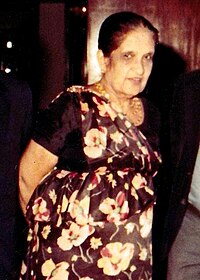Sirimavo Bandaranaike
Sirimavo Ratwatte Dias Bandaranaike (born April 17, 1916 in Balangoda , † October 10, 2000 near Colombo ) was a Sri Lankan politician from the Sinhalese majority . She was the first freely elected head of government on earth .
Bandaranaike held the office of Prime Minister Ceylon and Sri Lanka three times , in the years 1960–1965, 1970–1977 and 1994–2000. She was the leader of the Sri Lanka Freedom Party . Her husband was the former Prime Minister SWRD Bandaranaike . Her daughter Chandrika Kumaratunga was the country's president from 1994 to 2005.
Political career
After the murder of her husband by a politically radical Buddhist monk in September 1959, there was initially a phase of political instability. Under the interim premier Dahanayake, the government coalition fell apart, so that new elections were called for March 1960. The SLFP, founded by her husband and led by him to an election victory in 1956, asked Sirimavo Bandaranaike to appear in the election campaign. Although these received a positive response, the SLFP was only the second strongest party behind the UNP ( United National Party ), which formed a minority government under Senanayake. Since this remained without support in parliament, new elections had to be called for July.
From these elections on July 20, 1960, the SLFP emerged as the clear winner with Sirimavo Bandaranaike as the top candidate and she was the first woman in the world to take over the post of Prime Minister. Sirimavo Bandaranaike, who would hold her party's chairmanship until she died in 2000, continued her husband's socialist policies and nationalized companies in key economic sectors such as banking and insurance. Due to the unstable economic and political situation in the country, it declared a state of emergency that same year . As a result of their decision to abolish English as the official language and generally replace it with Sinhala , the language of the Sinhala majority, there was a campaign of civil disobedience by members of the Tamil minority. Many Tamils viewed the language laws as discriminatory and as an attempt to exclude them from access to government employment and the courts and offices. This "Sinhalese chauvinism" was one of the reasons for the later merger of several Tamil parties to form the Tamil United Liberation Front (TULF), which demanded the creation of a separate Tamil state ( Tamil Eelam ) in the north and east of the island.
Bandaranaike's government also faced problems when it nationalized foreign companies. The USA and Great Britain in particular reacted sharply and imposed an embargo on foreign aid for what was then known as Ceylon. As a result, it brought the country's politics closer to China and the Soviet Union , but Ceylon remained an non-aligned state .
In 1963 she was able to repel a military coup , but in 1964 she lost a vote of confidence and the subsequent election. In the next elections in 1970 she won back the majority by a large margin and was sworn in again as Prime Minister.
During her second term in office, a new constitution was passed, which changed the name of the country from Ceylon to Sri Lanka, among other things . The ties to the former colonial power Great Britain were almost completely dissolved. Just 16 months after the election, her government was almost overthrown by an armed uprising by left-wing groups. The country's small army , mainly equipped for ceremonial purposes, was unable to calm the situation. Bandaranaike asked the governments of friendly non-aligned countries for help. India and Pakistan jointly sent troops to Colombo , which succeeded in suppressing the uprising.
The 1973 oil crisis hit the Sri Lankan economy hard. Western aid was not to be expected because of the ongoing embargo and the government's economic policy had little effect. Bandaranaike himself proved to be increasingly intolerant of criticism and eventually even caused the closure of independent media outlets, which were among their fiercest critics. It had previously nationalized the country's largest newspaper ("Lake House"), which from then on served as the government's mouthpiece.
In 1976, Bandaranaike was elected chairman of the Non-Aligned Movement. While she was largely recognized and respected internationally, she lost noticeably less popular support in her home country; especially after it was confronted with allegations of corruption and the country's economy slid into an ever deeper crisis. Sirimavo Bandaranaike lost the 1977 elections by a large margin. In 1980 she was deprived of her right to public office for seven years for abuse of office.
During the following 14 years she remained in the opposition and, although her party could not win an election, repeatedly fought off attempts to oust her from the top of the party, including that of her own children. Her daughter Chandrika Kumaratunga finally succeeded in surpassing her mother in 1994 when she was elected President of Sri Lanka. At the same time, Sirimavo Bandaranaike began her third term as Prime Minister. She remained in this office until her death in 2000.
Web links
- Sirimavo Bandaranaike. In: FemBio. Women's biography research (with references and citations).
- Life and Legacy of Sirima Bandaranaike
| personal data | |
|---|---|
| SURNAME | Bandaranaike, Sirimavo |
| ALTERNATIVE NAMES | Bandaranaike, Sirimavo Ratwatte Slides |
| BRIEF DESCRIPTION | Sri Lankan politician, Prime Minister of Sri Lanka |
| DATE OF BIRTH | April 17, 1916 |
| PLACE OF BIRTH | Balangoda |
| DATE OF DEATH | October 10, 2000 |
| Place of death | near Colombo |
